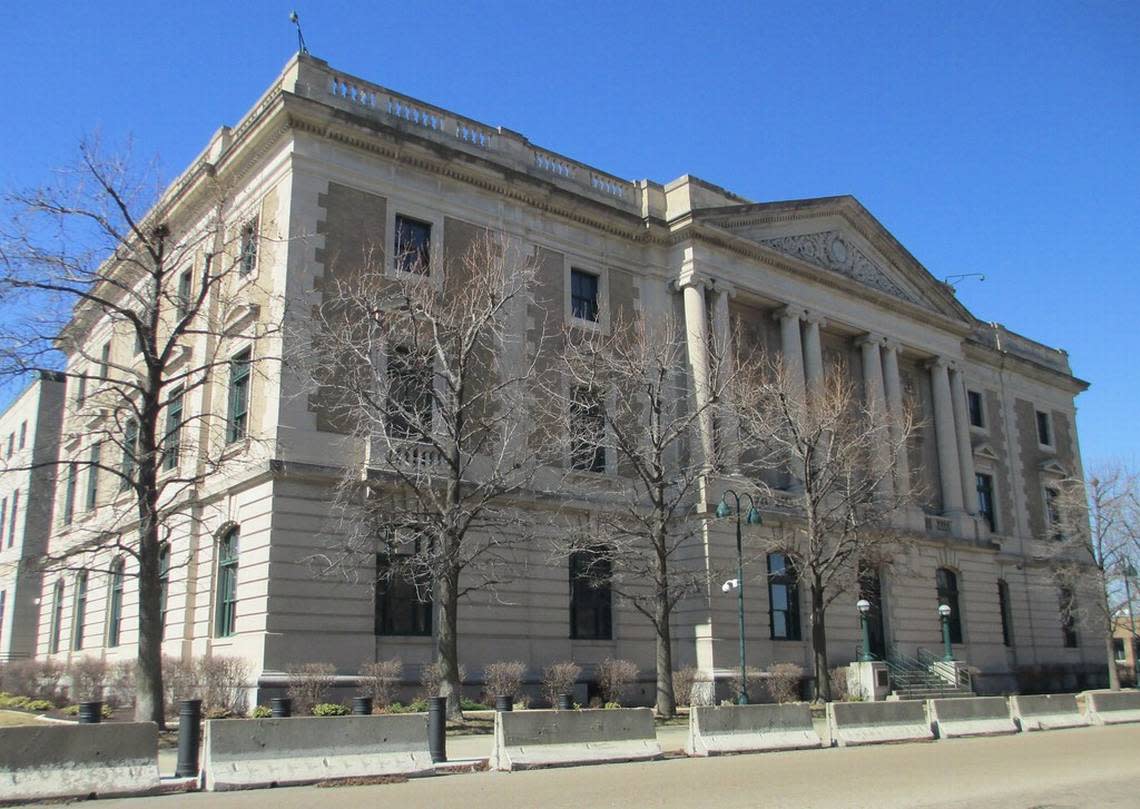Federal judge in East St. Louis temporarily blocks semiautomatic weapons ban in Illinois

A federal judge in East St. Louis issued an order Friday blocking enforcement of Illinois’ ban on certain semiautomatic weapons and high-capacity magazines until a lawsuit challenging the law is resolved.
Judge Stephen P. McGlynn, of the Southern District of Illinois, said the law known as the Protect Illinois Communities Act is likely to be found unconstitutional when the case goes to trial and the plaintiffs in the consolidated cases will suffer harms without a preliminary injunction to block its enforcement.
Attorney General Kwame Raoul’s office, which defended the statute during a hearing before McGlynn on April 12, said in a statement Friday, “We plan to file an appeal and remain committed to defending the constitutionality of the Protect Illinois Communities Act.”
In a 29-page opinion, McGlynn acknowledged that the law was passed in the wake of the fatal shooting of seven people at an Independence Day parade in Highland Park near Chicago last year. But he said the “senseless crimes of a relative few” cannot be used to justify abridging the constitutional rights of law-abiding citizens.
Citing a U.S. Supreme Court case that was decided less than two weeks before the Highland Park shooting, New York State Rifle and Pistol Association v. Bruen, he said the Constitution guarantees an individual right to keep and bear arms for self-defense.
“More specifically, can (the Protect Illinois Communities Act) be harmonized with the Second Amendment of the United States Constitution and with Bruen?” McGlynn asked rhetorically in the opinion. “That is the issue before this Court. The simple answer at this stage in the proceedings is ‘likely no.’”
McGlynn’s decision came less than a week after another federal judge, Lindsay Jenkins, of the Northern District of Illinois, reached an opposite conclusion and denied a motion to halt enforcement of the law. Plaintiffs in that case have indicated they intend to appeal to the Seventh Circuit Court of Appeals.
However, McGlynn’s order states that Illinois officials are “enjoined,” or prohibited, from enforcing the law “statewide during the pendency of this litigation until the Court can address the merits.”
The law prohibits the manufacture, sale and possession of more than 190 different types of firearms as well as many types of grips, stocks and attachments. It also bans large-capacity magazines like the ones used by the accused Highland Park shooter that enabled him to fire off more than 70 shots in just a few minutes.
Based on other recent U.S. Supreme Court cases, McGlynn said the state needed to show that the items being banned are not in “common use” and that they are the types of firearms that have been regulated historically.
The state argued that the law is consistent with historical tradition because neither assault weapons nor large-capacity magazines were in common use when the Second and 14th Amendments were ratified.
But McGlynn said that argument was “bordering on the frivolous” because the Supreme Court has said the Second Amendment extends even to firearms that did not exist when the Constitution was drafted.
He also noted that Friday’s ruling was not a final resolution of the case, but he said the state has other means available to address the issue of gun violence.
“There is a wide array of civil and criminal laws that permit the commitment and prosecution of those who use or may use firearms to commit crimes,” he wrote. “Law enforcement and prosecutors should take their obligations to enforce these laws seriously. Families and the public at large should report concerning behavior. Judges should exercise their prudent judgment in committing individuals that pose a threat to the public and imposing sentences that punish, not just lightly inconvenience, those guilty of firearm-related crimes.”
McGlynn was nominated to the bench by former President Donald Trump while Jenkins was nominated by President Joe Biden.
McGlynn’s ruling pertains to a group of four federal lawsuits that have been filed in East St. Louis against Gov. J.B. Pritzker and several other state and local officials over the law that plaintiffs allege is a violation of the Second Amendment of the U.S. Constitution.
Pritzker signed the law on Jan. 10.
The banned guns listed in the law, which was House Bill 5471, include the AK 47, AR-15 and Bushmaster ACR.
The law describes the guns as “assault weapons.” However, plaintiffs in the lawsuits filed against the state contend that this is an inaccurate term.
For instance, one of the federal lawsuits in East St. Louis, which includes Dane Harrel as a plaintiff from St. Clair County, alleges the law “inaccurately” describes the firearms as “assault weapons” and instead called them “popular semiautomatic firearms.”
Thomas Maag, an attorney from Wood River representing plaintiffs in one of the four federal cases in East St. Louis, said he was pleased to read the ruling by McGlynn.
“It appears he applied the proper analysis under the Supreme Court Bruen case,” Maag said.
Maag called on state officials to drop the case to save taxpayers the additional cost of defending the law in court.
Multiple lawsuits also have been filed in state court and those cases are pending. These suits allege lawmakers violated the state constitution in the process of passing the bill in January.
Belleville News-Democrat reporter Mike Koziatek contributed information to this article.

